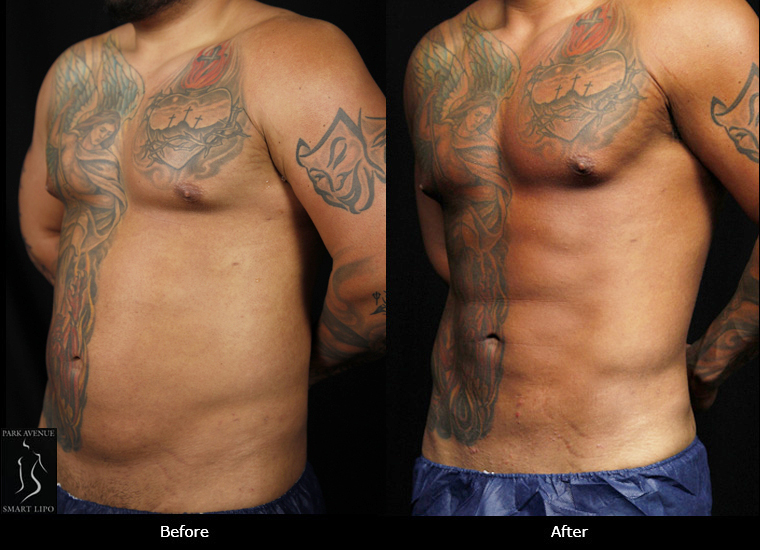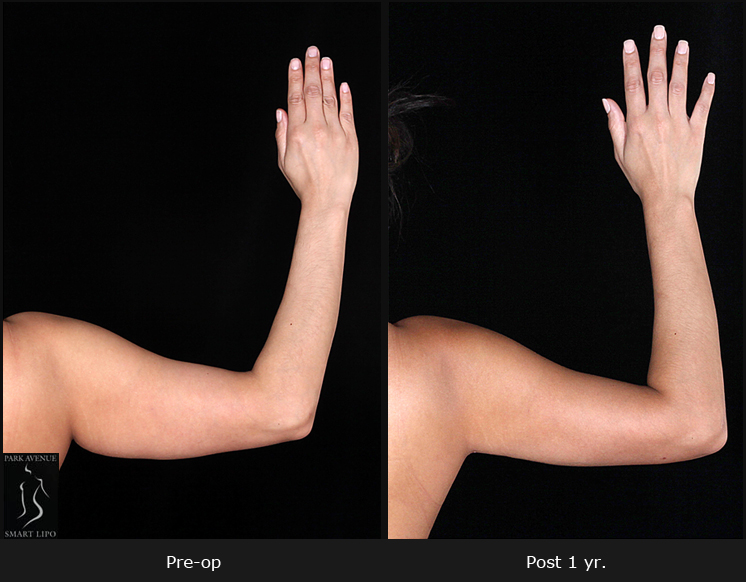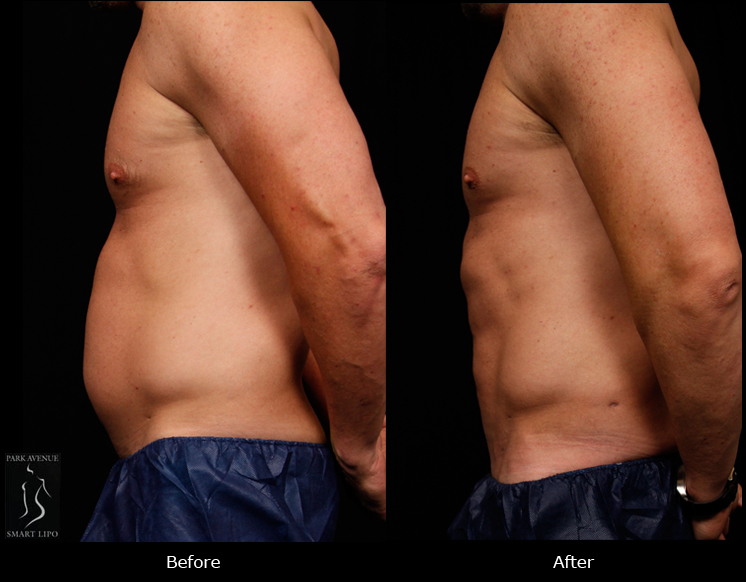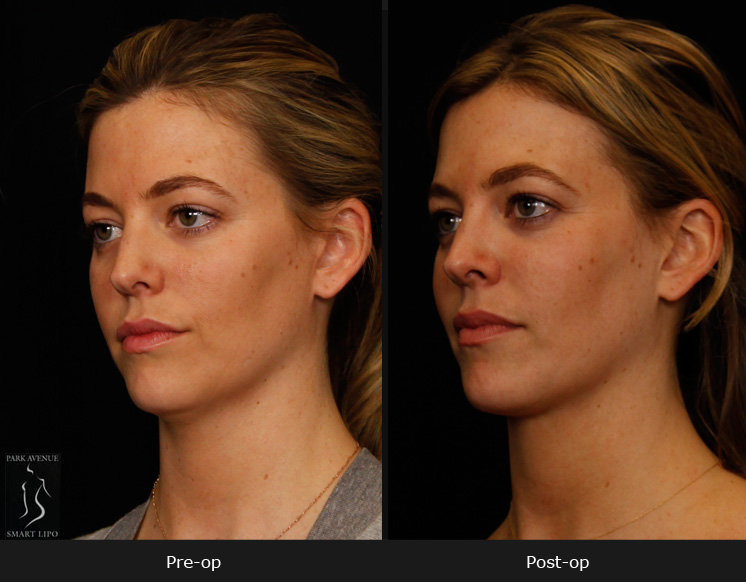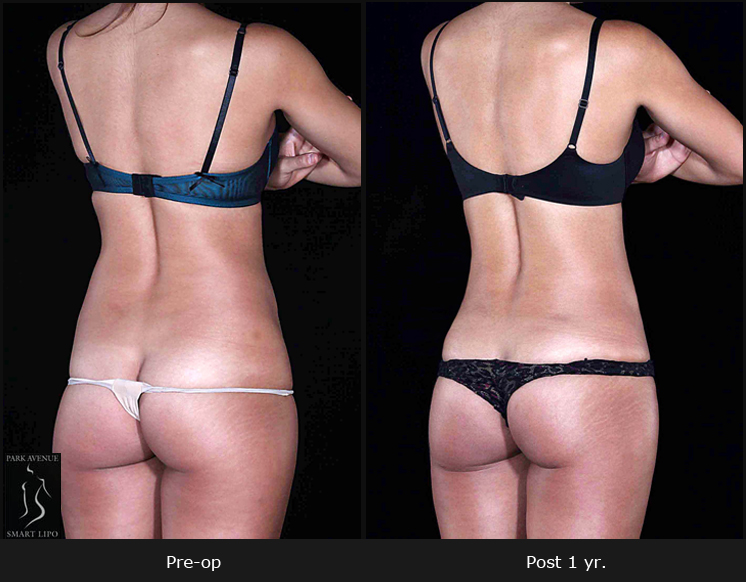Unwanted fat deposits in the buttocks area is a common concern for women. Caused by factors such as aging, hormonal imbalances, obesity, slow metabolism and pregnancy, this excess fat can affect your overall appearance. Even strenuous diets and rigorous workouts may prove ineffective when it comes to getting rid of this unwanted fat and achieving that trim and streamlined shape you want. Buttocks liposuction in Manhattan is a minimally invasive procedure that can remove the fat and improve the shape and symmetry of your butt. Performed using the FDA-cleared Smartlipo Triplex workstation, the treatment uses laser energy to remove excess fat, tighten the skin, and reshape the area to provide attractive and natural-looking results.
Ideal candidates for this procedure are those who are close to their normal weight, but have an out-of-proportion buttock area. Having firm, elastic skin is important. Good candidates are healthy with no underlying medical conditions and have realistic expectations about the outcome of the procedure. People who smoke, take blood-thinners (anti-coagulants), suffer from serious liver or kidney diseases, are dealing with heart failure, and pregnant or breastfeeding women are not considered good candidates for liposuction.
How Laser-assisted Buttocks Liposuction Is Performed
The Smartlipo Triplex workstation utilizes laser energy to dissolve the fat, which allows it to be suctioned off gently. The technique combines the power of three laser wavelengths -1064 nm, 1320 nm and 1440 nm – for effective fat reduction. The technology minimizes damage to surrounding tissues by allowing the surgeon to precisely target the treatment site. The intelligent delivery systems of the device – ThermaGuide, SmartSense and ThermaView – are designed to regulate energy delivery and prevent any risks of overtreatment.
Other benefits of body contouring in Manhattan include –
- Superior skin-tightening effects
- Short treatment time and downtime
- Quick and smooth recovery
- Performed on an outpatient basis
- Involves only local anesthesia
- Minimal swelling, bleeding and bruising
- Encourages the production of collagen
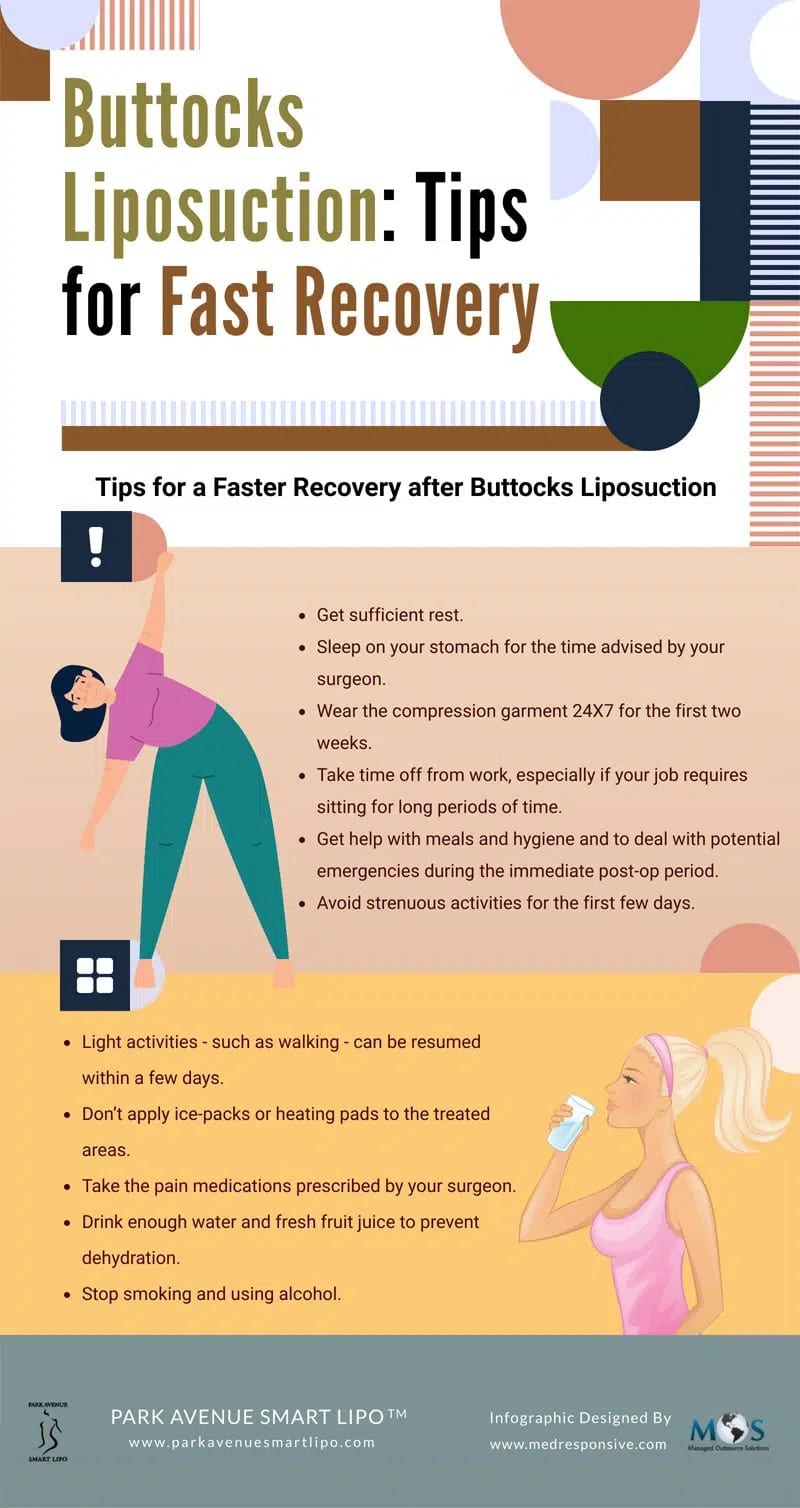
Best Ways to Recover from Buttocks Liposuction
- You may be advised to wear a compression garment 24X7 for the first two weeks post-op. This will support the surgical site, help circulation and skin shrinkage, and ease swelling.
- You should expect to take several days off from work, especially if it requires sitting for long periods of time.
- Practice sleeping on the stomach as after liposuction on the buttocks, patients may be asked to sleep on their stomachs until they are told otherwise.
- Do not eat or drink any fluids after midnight the evening before your surgery, regardless of the type of anesthetic: local/general.
- Having an assistant or caregiver during the immediate post-op period would help with meals, hygiene and potential emergencies.
- Patients have to take adequate sleep and rest completely as advised by their surgeon.
- Avoid taking aspirin, anti-inflammatory drugs and herbal supplements for two weeks before the treatment. Aspirin thins the blood and this can result in unnecessary blood loss.
- Avoid strenuous activities for the first few days after surgery, but you can return to light normal daily activities within a few days. Walking is encouraged to help promote good blood flow.
- To increase circulation and relax the muscles, massage is a great option. If done appropriately, post-op massage can help reduce pain, swelling, and inflammation, and promote healing.
- Take the pain medications prescribed by your surgeon, because some mild discomfort and pain is common.
- Wear loose-fitting, comfortable clothes on the day of the procedure.
- If you notice any signs of cold, infection, boils/pustules, or fever before the procedure, report this to your plastic surgeon immediately.
- Do not apply ice-packs or a heating pad to the treated areas.
- Quit smoking and alcohol consumption before and two weeks after surgery as it can impair the healing process and increase the risk of complications.
- Any minor discomfort and swelling will subside within 4 – 5 days.
- Drink adequate amounts of water and fresh fruit juice to prevent dehydration.
- Contact your surgeon immediately if you notice anything unusual, such as any signs of infection.
The amount of fat to be removed is determined by the desired post-op size, elasticity of the skin, and the skin’s ability to adjust to the new contour. Buttocks liposuction focuses on removing excess fat in the upper-outer buttocks, thus making it look wider and flatter. The surgeon may recommend liposuction of the hips and inner and outer thighs to optimize outcomes. The right candidate can expect to achieve good results with a pleasing reduction in the size and volume of the buttocks.
Planning ahead for the post-operative period and following your surgeon’s instructions can help you easily overcome any discomfort and the risk of complications associated with the procedure. Make sure that you don’t miss your follow-up appointments after surgery as this is crucial to ensure that you are healing properly, without any complications or abnormalities.
If you are planning to undergo buttocks liposuction in Manhattan, choose a reliable AAAASF-accredited practice that provides the services of plastic surgeons who are experienced and skilled in performing the procedure using Smartlipo technology. In a reliable practice, you can expect focused care right from the initial consultation to complete recovery.
Find out how our expert team can help you enhance your natural curves.

